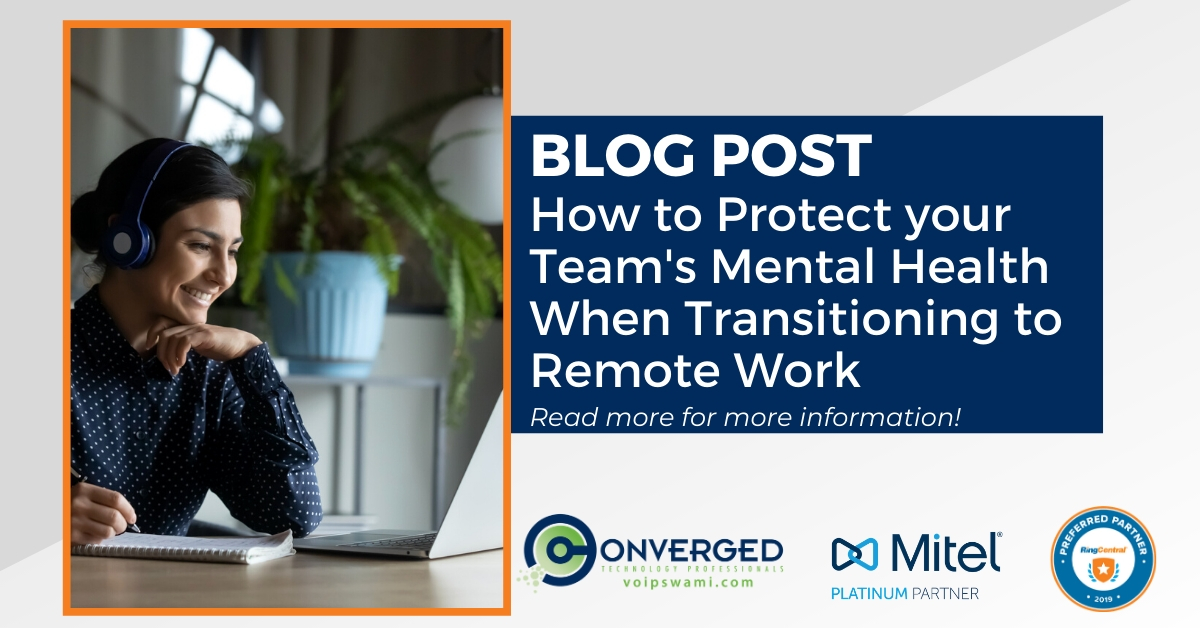
Now that your team has switched to remote work, it’s time to take a look at the advantages and potential risks associated with telecommuting. There are numerous noted benefits to letting your employees work from home, including higher productivity and an increase in employee happiness.
These studies were done before the COVID-19 pandemic changed the way we interact with one another. Your employees may be dealing with a lot more than changes outside of the workplace.
The impacts they’ve felt in their personal and social lives are all a part of how they perform at their job. Having the right methods and tools in place to support employee mental health in response to this crisis is essential.
You want your employees to be comfortable and secure in their positions. By implementing a plan to protect employee mental health during the shift to remote work, you’ll be better suited to handle issues in the future, and maintain stronger recruiting as your company bears the winds of change. Here are a few key ideas to get you started:
1. Have an Open Door Policy
Obviously, we don’t mean this literally. In a physical office, employees are aware they can bring concerns and issues to managers for face-to-face discussion. This is often one of the first standard processes to fade when teams switch to remote work. It’s particularly problematic when managers - who may be open and communicative face-to-face - don’t extend the same openness to digital communications.
Start by letting your employees know they can schedule a video or voice meeting whenever scheduling permits. While you’re likely to be busier than ever, or dealing with more than usual, make sure there’s time available in your calendar for employees to schedule these meetings when needed. A regular block of time can be good, or just send a message on your team communication software letting employees know when you’ve found an open period to talk.
This works well for vocal employees who won’t hesitate to bring up ideas and issues when they know you’re available. By making explicit that you’re always open to a chat, you set the right tone for employee-employer interactions going forward.
2. Schedule Regular Team Meetings
Employees who are more introverted or less likely to bring up topics on their own need just as much support as their more forthright peers. Even if someone is turning in work on time and up to standards, it doesn’t mean their mental health is as strong as the projects they work on.
Make sure you have a regularly scheduled all-hands meeting where attendance is mandatory, barring some previously-discussed circumstance. Not everyone needs to speak at these meetings, but have your camera on and dress professionally for these occasions. Just seeing that the people in charge are handling company matters capably goes a long way to allaying employee concerns.
You can have employees ask and answer questions via text while you lead over a video conference, or open the floor to queries at regular intervals during the meeting. Policies regarding mandatory use of audio and video should be handled carefully.
Workers may be uncomfortable about the idea of their kids suddenly appearing in the background during a meeting, or their appearance may not be to the standard they’ve set in the office. This isn’t a sign of poor performance - we’re all working a bit differently now that telecommuting has become the standard.
Give your employees some leeway to find their new routines and workflows, at least for the first few weeks. If you need more online presence from a particular individual, it’s best to handle these matters delicately and in private. A willingness to be flexible has a greater impact than a mandate someone working from home simply can’t meet.
3. Have Social Functions via Video Conference
Team barbecues, happy hours, staff retreats, holiday parties - this year, we’re all missing out on so much we used to take for granted. There’s no reason to simply let these events fall by the wayside, however. Online social functions are a great way to revive the spirit of socialization while maintaining social distancing.
Put work aside during these online social gatherings and let employees unwind a bit. Laughter has been noted as a key asset in the fight against corona virus anxiety. Playing something relaxing like team trivia, bingo, or another simple game can give employees the space to relax while socializing with coworkers in a way that feels natural.
If you’re short on ideas, open the floor to employees to get some good suggestions. You can schedule these events outside of work hours, but don’t make attendance mandatory in these cases. People will certainly join if they have the time, as we all miss seeing our colleagues face-to-face and hearing their voices, especially when the topic is not related directly to work projects.
For many companies, the switch to telecommuting is not entirely ideal. Yet by adapting standard practices into the realm of video conferencing, and adding in a few new ideas supported by the latest technologies, managers can ensure employees feel secure in their positions. Mental health is not something to take for granted. Do your part for your employees, and they’ll show their appreciation by being the stellar workers you want to support for the long-term.
If you enjoyed this article you may also enjoy:
Like this Article? Share it below!
